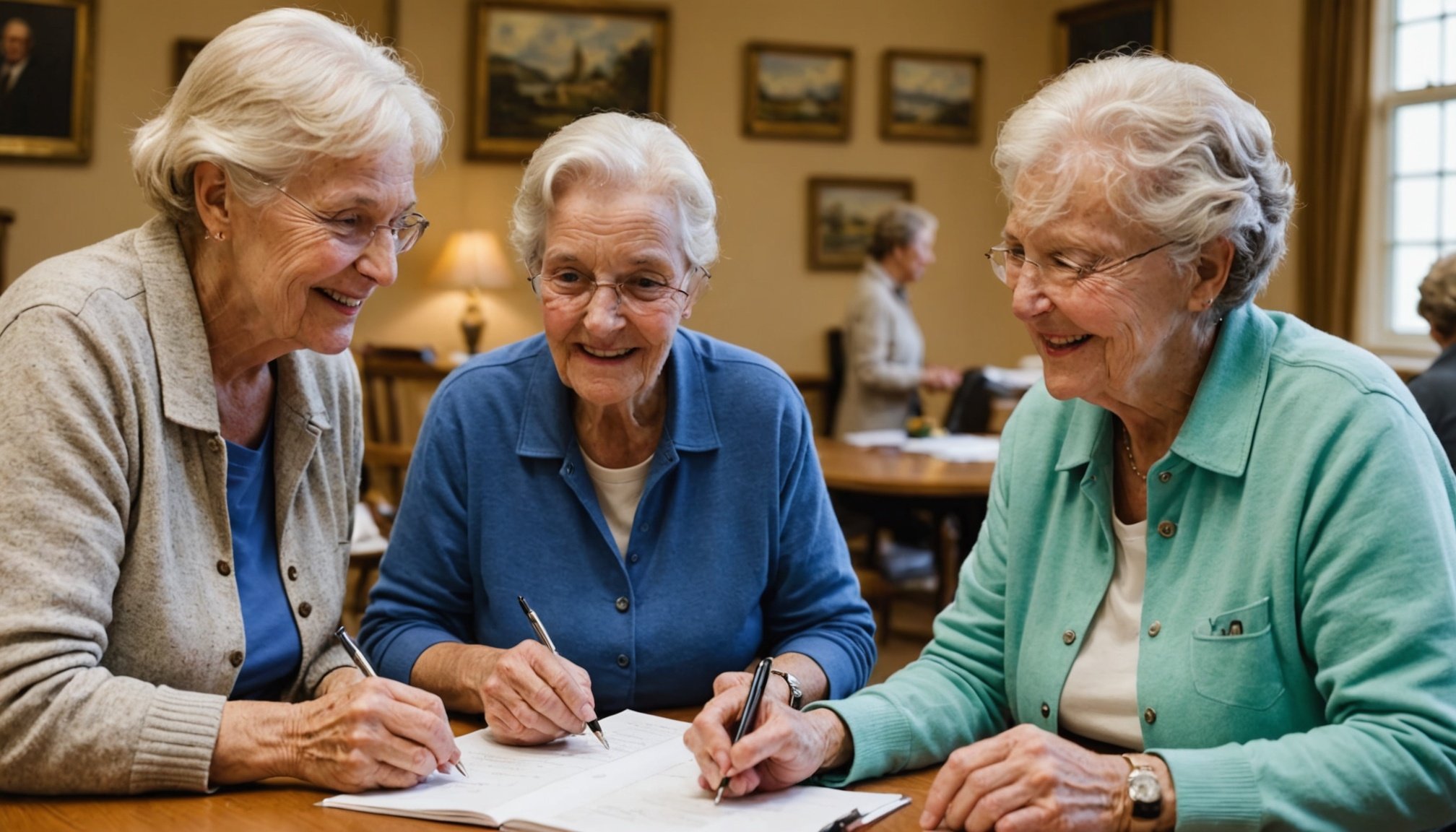Seniors aged 75 and above possess a wealth of experience and knowledge to share. Volunteering not only offers a chance to give back but also fosters connections with younger generations. Engaging through safe and meaningful opportunities enhances social ties and boosts overall well-being. This guide explores various volunteer roles that accommodate unique needs, ensuring safety and fulfillment for our valued seniors. Discover ways to make a lasting impact while enjoying the rewards of intergenerational exchange.
Overview of Safe Volunteer Opportunities for Seniors
Volunteering offers numerous benefits for seniors, enhancing both mental and physical health. Engaging in community service for the elderly can combat feelings of isolation, providing a sense of purpose and belonging. Safe volunteer programs for seniors are essential, as they ensure that elderly individuals can participate without compromising their well-being.
Intergenerational engagement is a particularly rewarding form of volunteering. It involves seniors working alongside younger generations, fostering mutual understanding and respect. This type of community service not only bridges the generation gap but also enriches the lives of participants by sharing diverse experiences and knowledge.
When considering safe volunteer programs for seniors, it's crucial to focus on several key aspects. Firstly, the physical demands of the tasks should match the seniors' abilities. Programs should also provide adequate training and support, ensuring that volunteers feel confident and secure in their roles.
In parallel : Maximizing Senior Healthcare: Essential Strategies for Effective Use of Mobile Health Apps
Additionally, transportation and accessibility are vital considerations. Ensuring that seniors can easily reach their volunteering sites without undue stress or risk is paramount. By addressing these factors, volunteer programs can create a safe and fulfilling environment for seniors, allowing them to contribute meaningfully to their communities while reaping the benefits of active engagement.
Types of Volunteer Opportunities
Exploring various volunteer options for seniors can significantly enhance their community engagement and personal fulfillment. These opportunities are designed to align with seniors' skills and interests while ensuring their safety and well-being.
Mentoring Programs
Mentoring programs offer seniors a chance to share their wisdom and experience with younger generations. These roles can be incredibly rewarding, providing benefits to both mentors and mentees. Seniors can guide young individuals through career advice, life skills, and personal development, creating lasting bonds. Organizations like Big Brothers Big Sisters and local community centers often offer such programs, facilitating intergenerational volunteering.
Educational Support Roles
Seniors can engage in educational support roles, such as tutoring and participating in literacy programs. These opportunities allow them to work with youth, enhancing their learning experiences. Safety protocols are integral to these roles, ensuring a secure environment for both seniors and students. Schools and libraries frequently seek volunteers for these educational activities, promoting lifelong learning and community engagement.
Community Service Initiatives
Local community service initiatives provide seniors with opportunities to contribute to service-oriented projects. Participating in activities like park clean-ups, food drives, or charity events fosters teamwork and collaboration with younger volunteers. These initiatives not only benefit the community but also strengthen intergenerational connections, enriching the lives of all involved.
Eligibility and Safety Measures
When considering senior volunteer eligibility, organizations typically look for individuals who are eager to contribute and possess a basic level of fitness suitable for the tasks at hand. While there are no strict age limits, some programs may have specific requirements based on the nature of the volunteer work.
Safety measures for elderly volunteers are crucial in ensuring a secure and supportive environment. Organizations often conduct risk assessments to identify potential hazards and implement strategies to mitigate them. These may include providing safety equipment, offering health checks, and ensuring the physical demands match the volunteers' capabilities.
Risk management for volunteers involves creating a framework that prioritizes the well-being of senior participants. This includes regular training sessions, emergency protocols, and access to first aid. Volunteers are encouraged to communicate any concerns, ensuring their comfort and safety during activities.
Support systems play a vital role in enhancing the volunteering experience. Many programs offer transportation assistance, on-site supervision, and peer support groups. These elements help seniors feel confident and appreciated, allowing them to focus on their contributions without worry. By addressing eligibility and safety, volunteer programs can foster a positive and enriching environment for seniors.
Benefits of Volunteering for Seniors
Volunteering presents numerous advantages for the elderly, significantly enhancing their quality of life. Engaging in volunteer work provides profound emotional and social benefits, fostering a sense of purpose and connection. Participating in these activities helps seniors build relationships, reducing feelings of loneliness and isolation. This social connectivity can be particularly rewarding, as it allows seniors to engage with younger generations, sharing experiences and insights that promote mutual understanding.
From a health perspective, the health benefits of volunteering are substantial. Active involvement in community service can lead to improved physical health, as it encourages seniors to stay active and engaged. This active participation can help maintain mobility, improve cardiovascular health, and boost overall well-being.
The emotional and psychological benefits are equally significant. Volunteering can enhance mood, reduce stress, and provide a sense of accomplishment. Engaging with others, particularly younger individuals, can invigorate seniors, offering them fresh perspectives and renewing their enthusiasm for life. This intergenerational interaction not only enriches their lives but also strengthens community bonds.
In conclusion, the advantages of volunteering for the elderly are multifaceted, offering emotional, social, and physical health improvements. Volunteering is a powerful tool for seniors to enhance their well-being and contribute meaningfully to their communities.
How to Get Involved in Volunteer Programs
Engaging in volunteer programs as a senior involves a few key steps to ensure a fulfilling experience. Begin by identifying your interests and skills, which will guide you in finding volunteer opportunities that align with your strengths. Consider what type of community service excites you, whether it's mentoring, educational support, or environmental initiatives.
To find suitable volunteer opportunities, explore resources such as local community centers, libraries, and online platforms dedicated to volunteer matching. Websites like VolunteerMatch and local government portals often list available programs, making it easier to join community service efforts that fit your preferences. Additionally, reaching out to friends or family who volunteer can provide valuable insights and recommendations.
Once you've identified a potential program, the next step is successful onboarding. This involves understanding the expectations and requirements of the role. Attend any orientation sessions offered, as they provide essential information about the organization and your responsibilities. Communicate openly with coordinators to clarify any doubts and ensure you feel prepared for your new role.
By following these steps to volunteer, seniors can find meaningful opportunities and make a positive impact. Embrace the chance to connect with others and contribute to your community, enriching your life and the lives of those around you.
Success Stories and Testimonials
Real-life volunteer success stories can inspire and motivate seniors to engage in community service. Personal testimonials from seniors often highlight the profound impact volunteering has on their lives. These stories not only showcase the benefits for the elderly but also illustrate the positive effects on younger generations.
One such story involves Margaret, a retired teacher who found renewed purpose through mentoring. Her testimonial reveals how sharing her educational expertise with young students reignited her passion for teaching. Margaret notes the joy of seeing her mentees thrive, which has enriched her retirement years significantly.
Another testimonial comes from John, who participated in a local park clean-up initiative. His experience highlights the camaraderie and sense of achievement gained from working alongside younger volunteers. John emphasizes how these interactions have broadened his social circle and enhanced his physical well-being.
The impact of volunteering extends beyond personal satisfaction. Seniors like Margaret and John often report a deep sense of connection with their communities. These interactions foster mutual respect and understanding between generations, creating a more cohesive society. Through their stories, seniors demonstrate that volunteering is a rewarding endeavor that benefits individuals and the community alike.
Resources for Seniors Seeking Volunteer Opportunities
Finding the right volunteer resources for seniors can enhance their community involvement and personal satisfaction. Various organizations and platforms are dedicated to facilitating these opportunities, ensuring they are accessible and rewarding.
Organizations for elderly volunteers such as RSVP (Retired and Senior Volunteer Program) offer diverse roles tailored to seniors' skills and interests. These programs focus on creating meaningful engagements, allowing seniors to contribute effectively while enjoying the benefits of volunteering.
For those comfortable with technology, several online platforms provide listings of volunteer roles specific to seniors. Websites like VolunteerMatch and Senior Corps offer extensive databases where seniors can search for opportunities that align with their interests and abilities. These platforms simplify the process of finding suitable roles, making it easier for seniors to get involved.
Local community centers also serve as valuable resources, often organizing volunteer activities that are both safe and engaging. These centers frequently collaborate with schools and non-profits to create intergenerational programs, fostering connections between different age groups. By tapping into these resources, seniors can find fulfilling volunteer opportunities that enhance their lives and strengthen community ties.
Conclusion and Next Steps
Engaging with community service offers seniors a rewarding path to personal growth and fulfillment. Taking the first step in volunteering can be daunting, but the benefits far outweigh the initial hesitation. Seniors are encouraged to explore opportunities that align with their interests, fostering a sense of purpose and connection.
Continuing volunteer efforts is crucial for maintaining engagement with younger generations. This intergenerational interaction enriches both parties, offering fresh perspectives and shared experiences. Seniors can cultivate these relationships by participating in diverse programs, from mentoring to community service initiatives.
To ensure sustained involvement, seniors should consider setting personal goals for their volunteering journey. This could include trying new roles or increasing their commitment to existing projects. By doing so, they can continue to grow and contribute meaningfully to their communities.
Future opportunities for growth through volunteering are abundant. As seniors become more involved, they may discover new interests or skills, opening doors to further contributions. Community centers and online platforms offer a plethora of roles that can challenge and inspire seniors, ensuring they remain active and engaged.
By embracing these next steps, seniors can create lasting impacts, both in their own lives and within their communities, fostering a vibrant and interconnected society.











